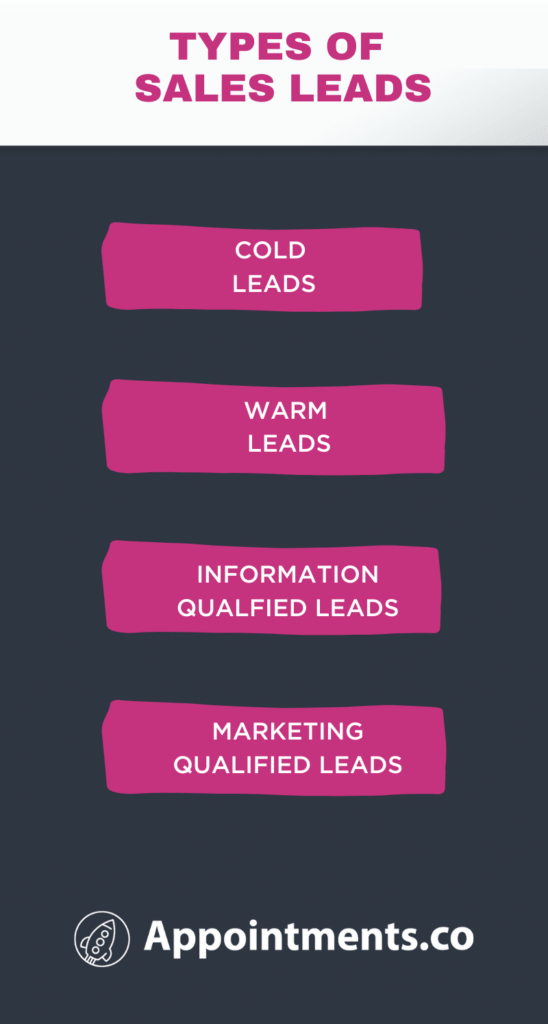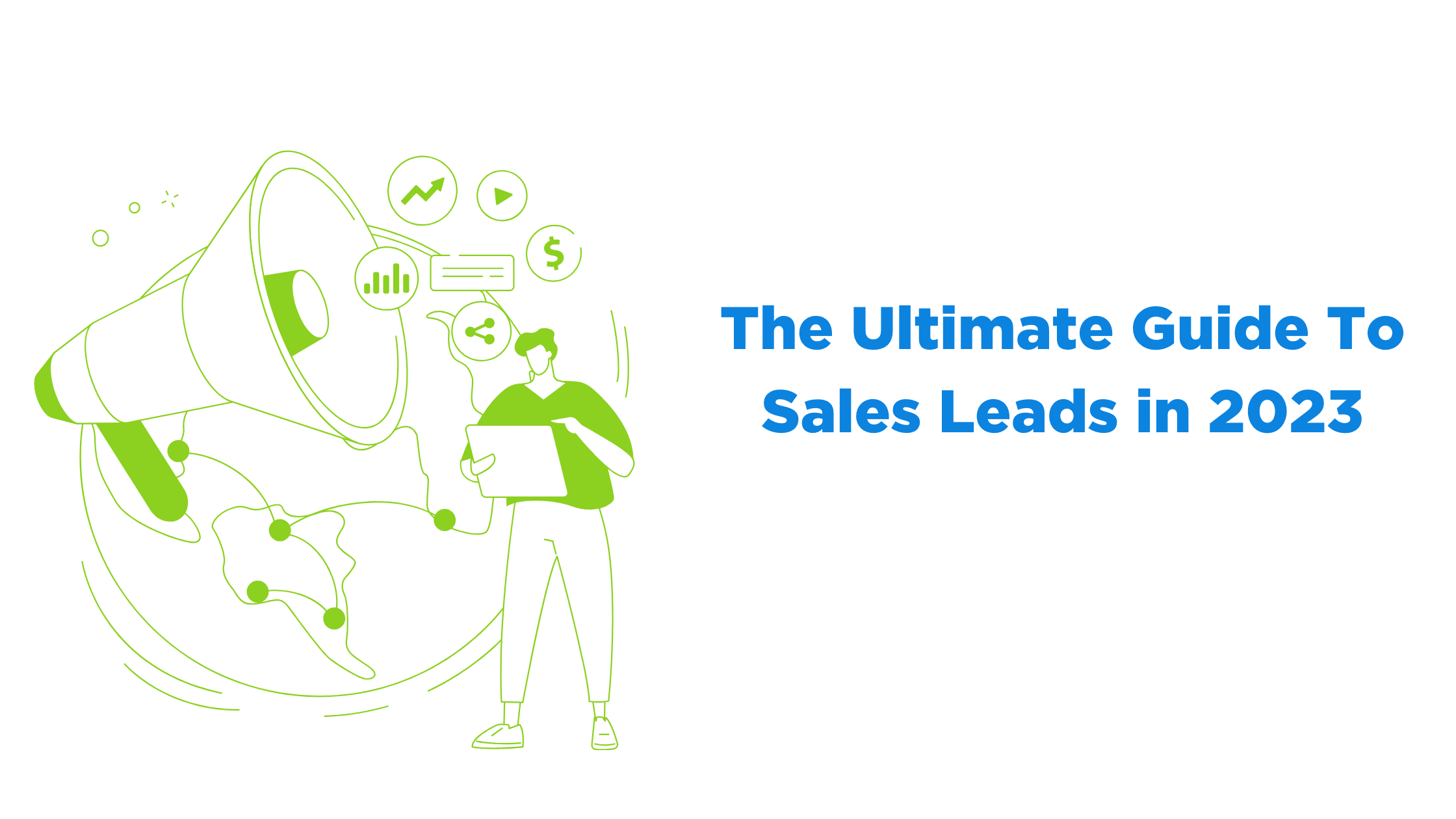If you’re new to the world of marketing and sales, you might have heard the term “sales leads” being thrown around a lot, but not fully understand what it means. Don’t worry, you’ve come to the right place.
In this article, we’ll cover everything you need to know about sales leads, from the definition to the various aspects of it. By the end, you should have a better understanding of what sales leads are, and how they can benefit your business. So, let’s get started.
Table of Contents:
- What Are Sales Leads?
- What Is a Sales Qualified Lead?
- The Importance of Sales Leads
- How a Sales Lead Works
- Types of Sales Leads
What Are Sales Leads?
Sales leads are target audiences, people, or businesses that can potentially become your customers. The data with which you can identify a potential customer of your product or service is also referred to as a sales lead.
You can generate sales leads through various marketing efforts, such as advertising, email marketing, third parties, cold calls, social media, and demonstrations. You cannot classify a sales lead as a sales prospect, since a business must conduct many examinations to determine the interest and purposes of a lead before qualifying them as a potential new client.
KEY TAKEAWAYS
- Sales leads refer to people or businesses who are currently not a customer but can eventually become.
- Sales leads can also be referred to as data, which can identify someone as a potential buyer of a service or product.
- The quality of the sales lead is determined by factors, such as the contact information’s accuracy, the rewards used to motivate the potential buyer, and the awareness of the prospect of the sales opportunity.
- A business can use various methods of sales lead generation, such as direct marketing response, advertising, calls, email marketing, and social media marketing.
What Is a Sales Qualified Lead?
A qualified lead, sometimes called a sales-qualified lead, is a potential customer who has moved through the sales pipeline. Their information has been acquired as a sales lead, and they have demonstrated enough interest that the sales team can work to turn them into an active customer.
The Importance of Sales Leads
Sales leads if properly analyzed, can guide you to new customers and open up opportunities to generate more revenue. By using these leads, you can set your aim on potential customers, focus on your marketing efforts, and develop your business.
Investing time in nurturing your sales leads can create a valuable source of potential customers that can help fuel your sales funnel. Ultimately, this can lead to an increase in revenue and help to grow your business.
How Sales Leads Works
The process of sales begins when sales lead data are generated, qualified, and placed in the company’s sales pipeline by a sales professional. Salespeople use the contact information of the lead to send cold and marketing emails, as well as outbound sales calls.
The quality of the sales leads is determined by several other factors including:

- The sales lead’s awareness of the sales opportunity when they respond.
- The accuracy of the lead’s data provided to the business.
- Whether or not the individual or business leads are given rewards in return for their contact information.
Types of Sales Leads

But, before we dive into converting prospects who are further down your sales funnel, let’s explore the various types of leads you’ll encounter at the top of your sales funnel. Learning how to nurture each type of lead in a cost-effective, timely, and practical way can help your business grow.
One thing leads have in common is that you, or someone in your sales and marketing department, have already identified them, via demographics or past buying behavior, as someone likely to be interested in your company. But, you’ll want to approach each type of lead differently to achieve the best results.
1. Cold Leads
Cold leads are at the top of your sales funnel. These leads have less of a chance of being familiar with your brand, but they might have read your blogs, commented on your social media posts, or had another kind of interaction.
These kinds of leads are generally hard to nurture, as you have to build your brand trust and make them familiar with your brand all the while educating them about your product or services, so they can come to a conclusion of whether or not your offerings entice them.
A cold lead could also be an individual on an email marketing list, a cold call list, or someone identified by you as a good fit for your ideal customer profile. At this stage, the goal is to simply contact these leads and determine if they are worth pursuing.
2. Warm Leads
Warm leads are leads that are well familiar with your brand and probably found your company through a trusted friend’s referral. They might have also found you through the efforts of inbound marketing, such as ads leading to landing page, outreach on social media, and blogs when they were looking for an answer to a question, or even when they were looking for other solutions for their problems.
In other words, it is easy to start a conversation with a warm lead, rather than gain the attention of a cold lead. You can reach out through emails, calls, and SMS to remind them of your past conversations with them or ask them questions about their needs or intent.
3. Information Qualified Leads
Information qualified leads, or IQLs, are a type of warm leads that could help to boost your business. These leads have already given you some information about their needs, maybe by downloading an e-book or filling out a form. You know they belong to your customer demographics, but you may not have any further details about them.
4. Marketing Qualified Leads
Marketing qualified leads, or MQLs, are another type of lead that could be a game-changer for your business. These are warm leads who have interacted with your company beyond just downloading a single content asset. For example, they may have attended a webinar, visited your site multiple times, or engaged with your team on social media.
This additional information allows the marketing department to keep nurturing the lead with more valuable content, or the sales team can step in and determine if this MQL is a good fit for a potential customer.
Frequently Asked Questions
1. What do sales leads do?
A sales lead is a potential customer or business entity that has shown interest in your product or service. To generate sales leads, businesses use various marketing strategies, such as advertising, trade shows, direct mailings, and third-party sources. Essentially, a sales lead refers to any information that can identify an individual or entity as a potential buyer.
2. What is an example of a sales lead?
An example of a sales lead could be an individual who filled out a contact or sign-up form on your website or landing page to request more information about your product or service.
3. What is a sales lead in CRM?
A lead refers to a potential sales opportunity that hasn’t been fully qualified yet. This can be an individual or a company that has shown some level of interest in what your business offers. When you’re using a CRM system, a lead is typically the first step in creating a record for that individual. This helps you keep track of the leads you have and work on converting them into paying customers.
Wrapping Up
Generating and effectively managing sales leads is crucial for any business that is looking to grow and succeed in today’s competitive marketplace. By making use of a variety of tools and strategies, such as targeted marketing campaigns, social media outreach, and lead scoring, businesses can identify and prioritize the most promising leads and increase their chances of converting them into loyal customers.
However, keep in mind that the process of lead generation takes time and requires consistent effort in order to get the desired results. You must stay focused and persistent to build a strong pipeline of high-quality sales leads and to drive sustainable growth over the long run.
If you are looking for services to improve your sales opportunities and your business to the next level, you can reach out to Appointments.co for quick and practical solutions.
Related Reads
- How to Generate Leads in Sales – 10 Effective Tips
- Things to Look Out for in Lead Generation Services – 6 Tips
- Lead Source – 5 Best Practices You Should Know
Illustrations – Storyset



